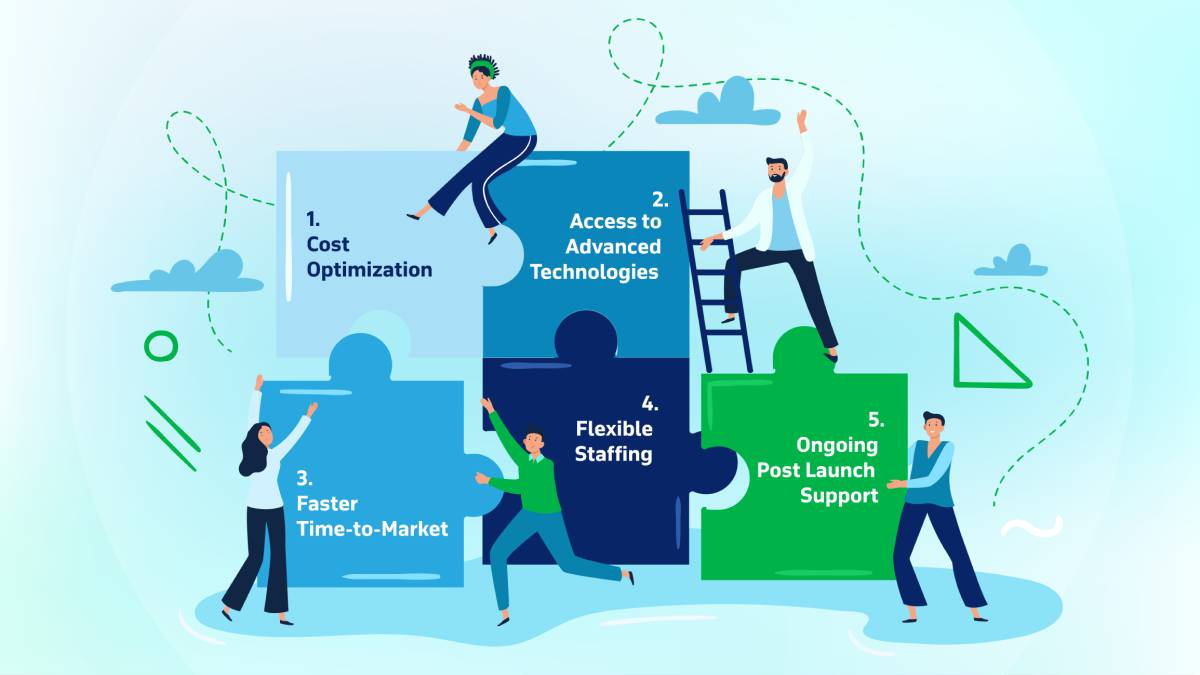Hiring a healthcare software engineer isn’t easy, even for companies with a strong outsourcing track record. Why? Because healthcare software development is no cakewalk.
Building healthcare software requires understanding and experience in ensuring compliance standards, patient data privacy, and systems scalability. Given this complexity, it’s no surprise that developers with the expertise to navigate this industry are hard to come by.
In this article, we’ll walk you through the essential considerations that simplify your hiring process and ensure you find the right healthcare software engineer for your needs. From identifying the proper skill set to using industry know-how, this guide is here to help you confidently build a team that lasts.
In-house vs Outsourcing a Healthcare Software Engineer
Let’s break down the key differences between building an in-house team and outsourcing healthcare software development to see which is right for your business.
Cost Effectiveness
In-house teams often have a higher price tag, considering office space, employee benefits, insurance, and taxes. With outsourcing, those overhead costs fall to the provider, making it a more cost-efficient option.
Talent Pool
Let’s be real: how many healthcare software developers can you find locally? In-house hiring can be limited by geography, while outsourcing opens up access to global talent.
Team Communication
In-house teams benefit from direct communication, especially with strong leadership. Outsourcing can sometimes face hurdles like language, culture, or time zones — but these challenges can be managed with the right partner.
Ownership
With an in-house team, you have complete control over your project’s intellectual property. When outsourcing, ensure you have clear IP ownership and confidentiality agreements.
Project Management
If you have the expertise and resources to manage healthcare software projects, in-house might work well. But if you’d rather focus on your core business, outsourcing to a specialized partner can ensure smooth execution from start to finish.
If in-house is your choice, your next focus should be building a solid recruitment plan. If outsourcing seems like the better fit, keep reading—we’ll guide you through choosing the right partner for your project.
Benefits of Outsourcing Healthcare Software Engineers
Outsourcing healthcare software engineers offers numerous advantages that can transform the efficiency and quality of software development healthcare. Key benefits include:
- Cost Optimization
- Access to Advanced Technologies
- Faster Time-to-Market
- Flexible Staffing
- Ongoing Post-launch Support

1. Cost Optimization
In today’s economic landscape, where organizations must do more with less, outsourcing healthcare software engineering offers significant cost savings.
For healthcare organizations unfamiliar with the technical side, finding qualified developers in-house can be difficult and risky, leading to costly mistakes in software development.
Outsourcing gives you access to top talent without investing in expensive infrastructure or a lengthy hiring process. Instead of handling recruitment, training, and overhead, outsourcing allows you to tap into a specialized team that delivers quality while keeping costs down. It’s a smart strategy to manage both development and your budget.
2. Access to Advanced Technologies
Outsourcing connects companies with the latest technologies and tools, keeping you ahead in today’s fast-paced tech landscape. With new software and platforms constantly emerging, outsourcing ensures your projects benefit from skilled healthcare software engineers who are experts in the latest technologies and methodologies.
Keeping up with tech advancements can be costly and time-consuming for businesses — especially small and medium-sized enterprises (SMEs). By partnering with specialized service providers, companies can stay ahead of the curve without needing constant upgrades or heavy investments in new tools.
3. Faster Time-to-Market
Outsourced healthcare software engineers excel at meeting tight deadlines efficiently. These specialized teams are experienced in working efficiently and meeting project timelines without sacrificing quality.
The team can quickly adapt to changes, especially when partnering with vendors that deploy with Agile methodology to ensure faster delivery of crucial healthcare applications. By delegating development tasks to outsourced experts, your internal teams are freed up to focus on other critical priorities, ensuring you get ahead of your competitors.
4. Flexible Staffing
Hiring full-time developers for short-term healthtech projects doesn’t always make sense. Why pay a full salary when you don’t have enough ongoing work to keep them busy? It’s simply not cost-effective.
Outsourcing gives you the flexibility to scale your team based on your project needs without long-term commitment. You get access to specialized talent when needed, and only for as long as the project requires, saving your time and money.
5. Ongoing Post-launch Support
Software development doesn’t stop at launch — that’s just the beginning. After deployment, maintaining a bug-free, fully functional application is vital, especially in healthcare, where reliability is necessary. Outsourced healthcare software engineer jobs provide dedicated, ongoing support, handling everything from troubleshooting to updates, ensuring your software runs smoothly.
Moreover, these teams offer round-the-clock monitoring and maintenance, so your software stays efficient and secure even as industry demands evolve. Outsourcing helps ease the worry of post-launch issues, which slow things down.
Choosing the Right Healthcare Software Engineer
Despite the abundance of IT outsourcing providers in today’s global market, finding qualified healthcare software engineers with deep expertise in the U.S. healthcare industry remains challenging. Here are a few key factors to help you begin:
- Healthcare Software Engineer Locations
- Healthcare Software Engineer Rates
- Healthcare Software Engineer Expertise

1. Healthcare Software Engineer Locations
The location of your outsourcing partner can shape both the working model and the shared goals both sides are working towards. There are three types of locations you should consider:
Onshore Outsourcing: Hiring healthcare software engineers within your country can ensure cultural and legal alignment, especially in America. However, this option often comes with significantly higher labor costs.
Nearshore Outsourcing: This option taps into talent from nearby countries with similar business cultures. Nearshore outsourcing minimizes risks and logistical challenges while being more affordable than onshore development.
Offshore Outsourcing: Offshore offers the most cost-effective solution, giving you access to skilled engineers from distant countries. While there may be differences in culture and legal frameworks, the potential for savings and flexibility makes offshore the most efficient choice, especially when partnered with a trusted provider that ensures smooth communication and quality control.
Choosing the right location depends on your project’s needs, budget, and the level of collaboration you require for success.

2. Healthcare Software Engineer Rates
The rates for a qualified healthcare software engineer vary significantly by region, driven by differences in social standards and income levels. In the U.S. and Western Europe, rates are typically higher due to advanced economies and higher living costs. Conversely, regions like Asia offer highly skilled engineers at more competitive prices, making them appealing for cost-sensitive projects.
Also, the complexity of your healthcare software directly impacts costs. For example, developing enterprise-level medical systems like hospital management platforms requires highly specialized engineers, leading to higher rates. In contrast, more straightforward consumer-focused medical software requires less sophisticated skills, translating to lower costs.
3. Healthcare Software Engineer Expertise
Healthcare software engineering demands a diverse skill set tailored to the specific needs of your project. Defining which roles are needed in your development project is critical to success.
Front-end/Back-end Engineering: These engineers are essential for building web-based medical portals used by patients and healthcare professionals. Their proficiency in frameworks like Angular, React, or .NET ensures smooth integration and functionality.
Mobile Development: For mHealth projects, mobile engineers specializing in Android, iOS, or cross-platform solutions are crucial. Their expertise ensures secure, regulation-compliant apps that offer seamless patient experiences.
Specialized Skillsets: Healthcare software engineers with specific skillsets, such as IoMT, AI, machine learning, etc., will be responsible for creating advanced healthcare solutions. If you plan to integrate advanced features, like smart devices or predictive analytics tools, you will need your team’s engineers with these specialized skills.
Find engineers with experience in those healthcare technologies and a deep understanding of regulations like HIPAA. Ensuring your development team has expertise in these areas will set the foundation for a successful project.
Determining The Cost of Hiring a Healthcare Software Engineer
Hiring a software engineer involves more than just salary expenses when considering healthcare software development companies. Key cost components include direct costs like compensation and indirect costs, including recruitment, training, and tools.

Direct Costs
Direct costs like salary, bonuses, and benefits are substantial when hiring in-house. In the U.S., the average software developer’s salary is about $142,741 per year, with additional costs for health insurance and retirement plans. Moreover, recruitment, onboarding, and add-in training expenses can make you look at thousands more to get new hires up to speed.
Outsourcing eliminates these recruitment and onboarding costs, allowing you to focus your budget where it matters—on the project itself.
Hidden Costs
Hidden costs can creep in as well. New hires typically take months to reach total productivity, which can disrupt team output. Plus, purchasing development tools and software licenses can be expensive, particularly for specialized healthcare systems.
If you’re outsourcing, you don’t have to account for this since these partners already have the tools, reducing your overhead.
Development Cost Calculator
Use tools that can clearly compare pricing models and cost variations by country for more effective planning and estimation. Our KMS Healthcare App Development Cost Calculator can simplify the process, giving you a full breakdown of all the healthcare software engineering cost factors—from labor to operations.
You can easily categorize your expenses into variable costs for staff and fixed costs for development infrastructure based on your team size. With this data, you’ll be equipped to make informed decisions and select the pricing model that fits your development goals.
Just input your team size and receive a detailed cost breakdown right in your mailbox:
Engineering the Future of Healthtech with KMS Healthcare
When hiring healthcare software engineers, there are several key factors to keep in mind. The best engineers will deeply understand the healthcare industry beyond just coding. If you know that, you already understand the most essential part of the process.

At KMS Healthcare, we bring years of experience working with U.S.-based healthcare software companies. Our senior resources specialize in everything from AI, ML, and telehealth to mobile app development. Here’s what we offer: Extensive onsite experience with U.S. healthtech clients
- Rapid team deployment to meet your project needs
- Full-cycle development of custom healthcare software solutions
- Ongoing maintenance and support to keep your software running smoothly
With KMS Healthcare, you’re partnering with a team that understands the complexities of healthcare technology and delivers top-tier results. Schedule a free consultation here.
